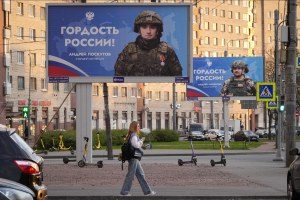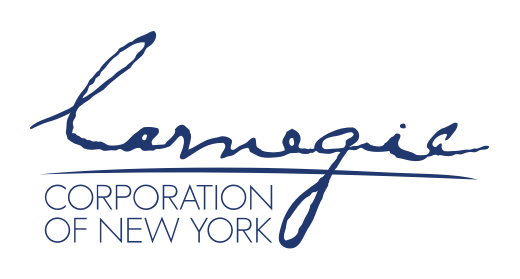Although the public continues to support the military operation in Ukraine, a plurality say it has caused more harm than good for Russia.
A just-completed September 26–October 2, 2024, public opinion survey in Russia conducted jointly by the Chicago Council on Global Affairs and the Levada Analytical Center seems to demonstrate some level of war fatigue among the Russian population. A plurality of Russians now think the conflict in Ukraine has more disadvantages than advantages for their country, and a slight majority now support the Kremlin moving to peace negotiations. But the results in total suggest that everyday Russians want a peace agreement to cement Russia’s battlefield gains—not to make any meaningful concessions to Kyiv.
Key Findings
- Six in 10 Russians (60%) believe that the lack of a peace agreement with Ukraine is a critical threat to Russia, and a slight majority (54%) say it is time to start peace negotiations rather than continue military action (38%).
- By a five to three ratio, Russians say that the special military operation in Ukraine has caused more harm (47%) than good (28%).
- Eight in 10 Russians (78%) say the possibility of the special military operation in Ukraine escalating into a conflict between Russia and NATO poses a critical threat to Russia, and 53 percent say a military confrontation between Moscow and NATO is likely if Russia prevails in the conflict with Ukraine.
- Despite these risks, three in four Russians continue to support their government’s military action in Ukraine (46% strongly support, 30% somewhat support).
- When asked directly whether Russia should make certain concessions to Ukraine to end the conflict, only two in 10 think it should (71% oppose). As in previous surveys, Russians remain unwilling to cede any of the occupied Ukrainian territories back to Kyiv.
Plurality Now Say the Conflict Has Caused Russia More Harm Than Good
Since launching its special military operation in Ukraine nearly three years ago, Russia has incurred significant economic and humanitarian costs. The Pentagon reports that military operations in Ukraine have cost Russia up to $211 billion, in addition to $1.3 trillion in previously anticipated economic growth through 2026. More than that, the special military operation in Ukraine has cost Moscow billions of dollars’ worth of sanctioned assets and losses in trade and oil revenue, not to mention the mass emigration of skilled workers and hundreds of thousands of killed or wounded troops. In addition, Ukraine’s incursion into the Kursk region in Russia proper unsettled many Russians, as did Ukrainian drone strikes against targets in Russia.
Many Russians express some dissatisfaction with the negative effects of the conflict. By a five to three ratio, more Russians say that the special military operation has caused more harm (47%) than good (28%) for Russia. Another quarter find the question too difficult to respond to (25%). This represents an increase in negative evaluations from 2023, when Russians were more closely divided (41% more harm, 38% more good, 21% difficult to answer). 1
More Now Support Peace Negotiations Than in 2023
Although several rounds of negotiations have been held and international actors have proposed at least 25 different peace plans since the start of the conflict in 2022, the path to a peaceful resolution still remains unclear. Before a Ukrainian-sponsored peace summit in Switzerland last June, Russian President Vladimir Putin offered up a ceasefire plan that called for Ukraine to pledge not to join NATO and for the withdrawal of Ukrainian troops from all the territories partially occupied by Russia. However, leaders from both Ukraine and the United States rejected these conditions.
Whether they are aware of Putin’s proposal or not, six in 10 Russians believe that the lack of a peace agreement with Ukraine is a critical threat to Russia (60%). To place this result into context, the lack of a peace deal rates lower than terrorism (80% critical threat) but slightly ahead of NATO’s presence in Eastern Europe or the prospect of large numbers of immigrants and refugees entering Russia (55% each). The lack of a peace agreement also rates well above the possibility of an economic downturn (44%), climate change (35%), and weakening democracy in Russia (30%).
A slight majority of Russians (54%) now say it is time to start peace negotiations, while just under four in 10 say it is better to continue military action (38%). This contrasts with results from May 2023, when Russians were evenly divided (48% continue military operations vs. 45% start peace talks). The data suggest that support for ending the special military operation and pursuing peace talks increases among Russians when Putin puts forth a peace proposal. By contrast, if Putin speaks out against peace talks, as he did around the Russian elections and Ukraine’s Kursk offensive, popular support for negotiations wanes.
Survey results are somewhat mixed on what Russians would think of a definitive peace deal. In a question randomly asked of half the survey sample, three-quarters of Russians say that, if Putin decided to end the military conflict with Ukraine this week, they would support this decision (73%, up from 62% in May 2023).
Yet support for peace talks drops dramatically—to just 31 percent—if such a move includes returning annexed territories to Ukraine. Ceding the territories Russia has gained in the war remains unpopular, with six in 10 Russians continuing to oppose returning territory to Ukraine (60%, similar to 62% in 2023).
A subsequent series of questions makes Russian opposition to compromise as part of peace talks very clear. Majorities of seven in 10 or more say that returning Luhansk and Donetsk (75%) or the occupied areas of Zaporozhye and Kherson to Ukraine (69%) are not acceptable under any circumstances. Three in four also say it is completely unacceptable for Ukraine to join NATO (73%). On the other hand, solid majorities support an immediate ceasefire (61% say it is preferable, 17% call it acceptable) and prisoner exchange (87% preferable, 75% acceptable) as part of a peace agreement.
Russians Expect Trouble from NATO and the West if Russia Wins War
In late September, Putin released a video on the second anniversary of the 2022 referendum he claims annexed four Ukrainian territories to Russia. He used the platform to repeat his assertion that “Western elites” are using Ukraine as “a military outpost aimed at Russia.” He was also quoted as saying that these same elites “systematically instilled hatred and radical nationalism” in Ukraine and “fueled hostility towards everything Russia.”
This type of rhetoric has bolstered Russian negativity toward NATO and a sense of threat from the West among everyday Russians. Eight in 10 Russians consider a possible escalation of Russia’s military action in Ukraine into a wider war between Russia and NATO a critical threat to their country (78%). And a smaller majority consider NATO’s presence in Eastern Europe a critical threat (58%). While only three in 10 Russians consider Russia’s isolation from Western countries a critical threat (28%), an additional 36 percent rate it as an important but not critical threat.
Should Russia win the war, Russians say it is very or rather likely that there would be a major migration of Ukrainian refugees to Europe and the United States (72%) and that the United States would deploy more military forces to US bases in Europe (66%). A smaller majority believe there would be a military confrontation between Moscow and NATO allies (53% call it at least somewhat likely). Only 36 percent think it is likely that additional former Soviet republics would seek NATO membership, and only 23 percent say it is likely that Russia would take additional military action against other former Soviet republics.
Russians Defiant despite Potential Consequences if Russia Defeats Ukraine
Despite the risks associated with a potential Russian victory in the conflict, including a potential military confrontation between Russia and NATO, Russian public support for the special military operation remains solid. Similar to attitudes since April 2022, three in four Russians (76%) continue to say they strongly (46%) or somewhat (30%) support Russia’s special military operation (16% strongly or somewhat oppose it). Approval for the special military operation has been generally stable since the war began, except for slightly elevated levels of strong support in March 2022 and February 2023 (see figure).
This continued support could reflect both the public’s “rally around the flag” sentiments, given Ukraine’s more aggressive attacks inside Russia itself and recent Russian military advances in eastern Ukraine. A majority say that Russia has been successful in the conflict with Kyiv (60%), similar to attitudes in May 2023 (61%) and up from 53 percent in November 2022. About a quarter say it has been unsuccessful (23%, 27% in 2023, and 31% in 2022).
Conclusion
These results show that Russians would support a peace agreement if it was basically freezing the current battle lines so that Russia could secure its gains in Ukraine. Most Russians are unwilling to make the concessions that would lead to a peaceful resolution of the conflict, and a wide majority continue to support Russia’s ongoing military action in Ukraine.
- 1In 2023, survey respondents who perceived more harm than benefit were asked to volunteer (in an open-ended question) what harm they see from the military operation. A majority focused on the death of civilians and soldiers (70% combined), followed by economic deterioration (20%) and international isolation (10%).
The Chicago Council-Levada Center survey was conducted September 26-October 2, 2024, among a representative sample of all Russian urban and rural residents. Levada Center interviewers conducted these personal interviews in respondents’ homes. The survey sample consisted of 1,606 people aged 18 or older in 137 municipalities of 50 regions of the Russian Federation.
The data set is weighted by gender, age, and level of education for each type of settlement (large cities, medium cities, small towns, villages) within each Federal district independently, in accordance with Rosstat data. The margin of error for the full sample is 3.4 percentage points at a 95 percent confidence interval.






Related Content
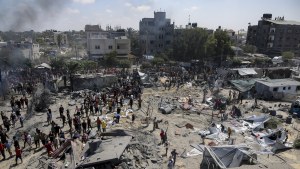 Public Opinion
Public Opinion
A plurality say the United States and NATO are most responsible for ongoing bloodshed and instability in the Middle East.
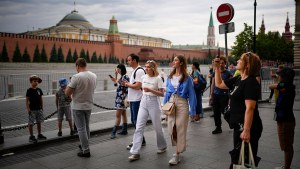 Public Opinion
Public Opinion
Russian young adults have a more positive economic and political outlook than their American counterparts, yet both youth populations think equally about emigrating.
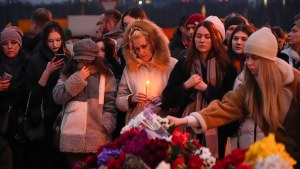 Public Opinion
Public Opinion
Before the Crocus City Hall attack, a plurality of Russian young adults said Russia’s top foreign policy priority should be bolstering the country’s physical defenses.
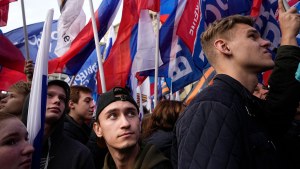 Public Opinion
Public Opinion
Although a plurality of young Russians say they are anxious about Russia’s political future, few vote or participate politically.
